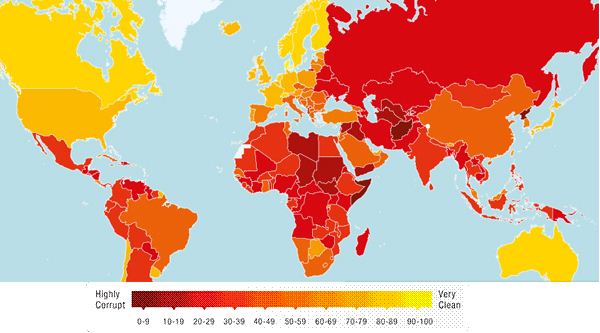The latest index on corruption has just been announced. The Corruptions Perceptions Index 2014 has been published by Transparency International.
The 20th edition of the index uses a range of indicators to arrive at its ranking of 175 countries. The word ‘perceptions’ is one signal that it is not just based on the number of anti-corruption cases brought in a year since that could be a sign that a country is either very good or very poor at bringing corruption crimes to justice.
One example of this is Russia, which is now mulling over plans to bring in anti-corruption screening for its civil service. Russia came in 136th place out of the 175 countries in the index, its score having slid from its 2012 and 2013 positions by a point. This puts it in equal place with Iran and Nigeria. It is below its neighbours such as Kazakhstan (126th) and China (100th).
Yet the number of anti-corruption trials brought in Russia has risen. In 2012 there were 18,000 such cases, but by 2013 this had increased to more than 28,000. The fact that this has not had a positive impact on Russia’s placing in the index is one sign that there is still a long way to go in Russia in terms of corruption in public office.
One solution being considered is to test every state official to prove their ability not to be corrupted. The Russian Ministry of Labour and Social Protection has suggested that interviews, using psychological assessment tools, would show an official’s aptitude for being corrupted. This would be applied to both current and future civil servants.
It is claimed the tests have a 90% accuracy result, and would form part of the ministry’s proposed federal programme for development of the state civil service over the next three years. It is suggested that the tests could be in place as early as June 2015, although no firm decisions have yet been made.
The index has Denmark with the least likelihood of corruption. Scandinavian countries make up four of the top five places – the exception is New Zealand in second place. At the other end of the scale, both North Korea and Somalia tie for bottom place.
Transparency International is a non-aligned organisation which is politically independent. They take donations so long as that does not compromise their work. Their website clearly lays out who has donated, from government departments and agencies around the world, such as the DFID, to large organisations in the corporate sector such as EY, and other donor organisations such as the Association of European Professional Football Leagues.

